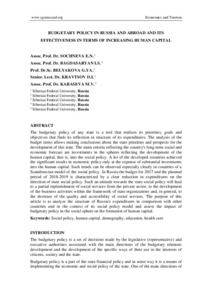BUDGETARY POLICY IN RUSSIA AND ABROAD AND ITS EFFECTIVENESS IN TERMS OF INCREASING HUMAN CAPITAL
Скачать файл:
URI (для ссылок/цитирований):
https://sgemworld.at/ssgemlib/spip.php?article4357&lang=enhttps://elib.sfu-kras.ru/handle/2311/110699
Автор:
Sochneva, E. N.
Bagdasarian, I. S.
Belyakova, G. Y.
Kravtsov, D. I.
Karaseva, M. S.
Коллективный автор:
Институт управления бизнес-процессами и экономики
Кафедра теоретических основ экономики
Дата:
2017-10Журнал:
SGEMКвартиль журнала в Web of Science:
без квартиляБиблиографическое описание:
Sochneva, E. N. BUDGETARY POLICY IN RUSSIA AND ABROAD AND ITS EFFECTIVENESS IN TERMS OF INCREASING HUMAN CAPITAL [Текст] / E. N. Sochneva, I. S. Bagdasarian, G. Y. Belyakova, D. I. Kravtsov, M. S. Karaseva // SGEM: 4th International Multidisciplinary Scientific Conference on Social Sciences and Arts SGEM 2017. — 2017. — Т. 1 (№ 4). — С. 107-112Текст статьи не публикуется в открытом доступе в соответствии с политикой журнала.
Аннотация:
The budgetary policy of any state is a tool that realizes its priorities, goals and objectives that finds its reflection in structure of its expenditures. The analysis of the budget items allows making conclusions about the state priorities and prospects for the development of this state. The main criteria reflecting the country’s long-term social and economic forecast are investments in the spheres reflecting the development of the human capital, that is, into the social policy. A lot of the developed countries achieved the significant results in economic policy only at the expense of substantial investments into the human capital. Such trends can be observed especially clearly in countries of a Scandinavian model of the social policy. In Russia the budget for 2017 and the planned period of 2018-2019 is characterized by a clear reduction in expenditures on the direction of state social policy. Such an attitude towards the state social policy will lead to a partial replenishment of social services from the private sector, to the development of the business activities within the framework of state organizations and, in general, to the decrease of the quality and accessibility of social services. The purpose of this article is to analyze the structure of Russia’s expenditures in comparison with other countries and in the context of its social policy model and assess the impact of budgetary policy in the social sphere on the formation of human capital.

